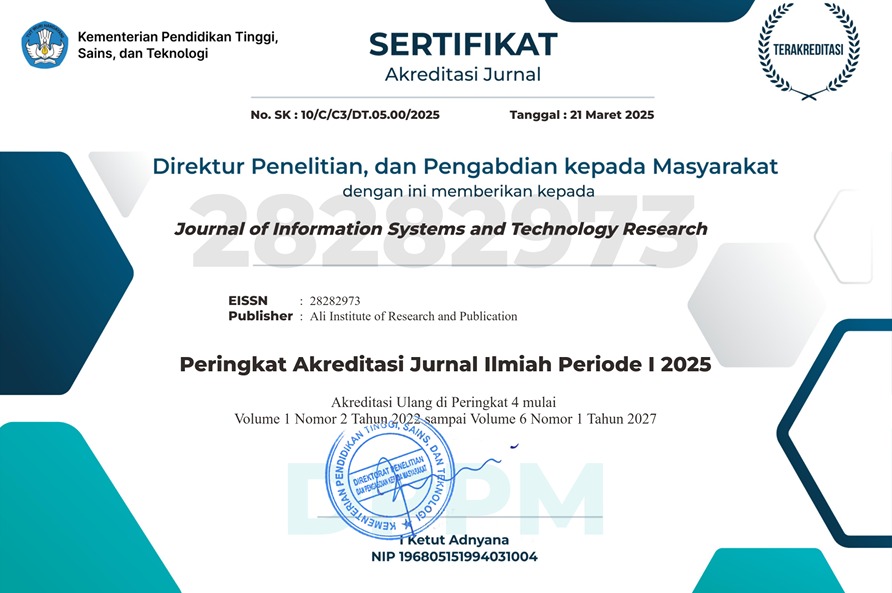Direct implementation of AI-Based Facial Recognition for ITSI students
DOI:
https://doi.org/10.55537/jistr.v3i3.898Keywords:
AI, Face Recognition, ITSIAbstract
The development of artificial intelligence (AI)-based facial recognition technology has become a significant research topic in the field of computing and security. At the Indonesian Palm Oil Institute (ITSI), AI-based facial recognition is introduced to students to improve their skills in developing AI-based applications. This study aims to implement and test a facial recognition system using a Python program by utilizing a dataset generated independently. This research method involves several stages, namely collecting ITSI students' facial data, data processing, creating a facial recognition model using a machine learning algorithm, and evaluating model performance. The dataset used was developed through a live shooting session involving active student participation. The facial recognition model was trained using a convolutional neural network (CNN) algorithm that was optimized to improve accuracy. The results of the study showed that the developed model was able to achieve high facial recognition accuracy, with an average accuracy rate of 92%. The discussion includes an analysis of factors that affect accuracy, such as variations in lighting and shooting angles, as well as the potential use of this technology in a campus environment, including for attendance and security purposes. The conclusion of this study shows that the implementation of AI-based facial recognition can be effectively applied in an academic environment, as well as providing students with practical experience in developing and testing AI applications. This study also opens up opportunities for further research on improving the performance of facial recognition systems and their application in various real-world scenarios.
Downloads
References
H. Ge, Z. Zhu, R. Liu, and X. Wu, “Application of Multiscale Facial Feature Manifold Learning Based on VGG-16,” J. Sensors, vol. 2021, 2021, doi: 10.1155/2021/7129800.
G. Kanavakis, D. Halazonetis, C. Katsaros, and N. Gkantidis, “Facial shape affects self-perceived facial attractiveness,” PLoS One, vol. 16, no. 2 February, pp. 1–17, 2021, doi: 10.1371/journal.pone.0245557.
M. A. S. Pane, K. Saleh, A. Prayogi, R. Dian, R. M. Siregar, and R. Aris Sugianto, “Low-Cost CCTV for Home Security With Face Detection Base on IoT,” J. Inf. Syst. Technol. Res., vol. 3, no. 1, pp. 20–29, 2024, doi: 10.55537/jistr.v3i1.769.
G. A. Rama, F. Fauziah, and N. Nurhayati, “Perancangan Sistem Keamanan Brangkas Menggunakan Pengenalan Wajah Berbasis Android,” J. Media Inform. Budidarma, vol. 4, no. 3, p. 635, 2020, doi: 10.30865/mib.v4i3.2149.
A. Prayogi et al., “ENHANCING NETWORK PERFORMANCE LOAD BALANCING IN CYBER CAFE NETWORKS WITH DIJKSTRA ALGORITHM ON MIKROTIK,” J. Tek. Inform., vol. 5, no. 1, pp. 253–261, 2024, [Online]. Available: https://jutif.if.unsoed.ac.id/index.php/jurnal/article/view/1644/448
B. Jaeger and A. L. Jones, “Which Facial Features Are Central in Impression Formation?,” Soc. Psychol. Personal. Sci., 2021, doi: 10.1177/19485506211034979.
R. Grycuk, A. Wojciechowski, W. Wei, and A. Siwocha, “Detecting Visual Objects by Edge Crawling,” J. Artif. Intell. Soft Comput. Res., vol. 10, no. 3, pp. 223–237, 2020, doi: 10.2478/jaiscr-2020-0015.
F. Gonten, F. Nfwan, and A. Ya’u Gital, “Pre-Review Convolutional Neural Network for Detecting Object in Image Comprehensive Survey and Analysis,” J. Inf. Syst. Technol. Res., vol. 3, no. 2, pp. 45–64, 2024, doi: 10.55537/jistr.v3i2.799.
A.- Suryansah, R.- Habibi, R. M. Awangga, and R. N. S. Fatonah, “Implementasi Face Recognition Untuk Mengakses Ruangan,” J. Mediat., vol. 3, no. 3, p. 25, 2020, doi: 10.26858/jmtik.v3i3.15176.
“Jenis-Jenis Penelitian Lengkap dengan Contoh dan Penjelasannya.” Accessed: Feb. 14, 2022. [Online]. Available: https://penerbitdeepublish.com/jenis-jenis-penelitian/
M. Z. Syahputra and M. D. Irawan, “Application Of Bootstrap In Building Application Of Fertilizer Inventory System,” J. Inf. Syst. Technol. Res., vol. 1, no. 1, 2022, [Online]. Available: http://download.garuda.kemdikbud.go.id/article.php?article=2819386&val=25211&title=Application of Bootstrap in Building Fertilizer Inventory System Applications
L. Farokhah, “Implementasi K-Nearest Neighbor untuk Klasifikasi Bunga Dengan Ekstraksi Fitur Warna RGB,” J. Teknol. Inf. dan Ilmu Komput., vol. 7, no. 6, p. 1129, 2020, doi: 10.25126/jtiik.2020722608.
Muhammad Nur Ichsan, Nur Armita, Agus Eko Minarno, Fauzi Dwi Setiawan Sumadi, and Hariyady, “Increased Accuracy on Image Classification of Game Rock Paper Scissors using CNN,” J. RESTI (Rekayasa Sist. dan Teknol. Informasi), vol. 6, no. 4, pp. 606–611, Aug. 2022, doi: 10.29207/resti.v6i4.4222.
M. Harahap, Em Manuel Laia, Lilis Suryani Sitanggang, Melda Sinaga, Daniel Franci Sihombing, and Amir Mahmud Husein, “Deteksi Penyakit Covid-19 Pada Citra X-Ray Dengan Pendekatan Convolutional Neural Network (CNN),” J. RESTI (Rekayasa Sist. dan Teknol. Informasi), vol. 6, no. 1, pp. 70–77, 2022, doi: 10.29207/resti.v6i1.3373.
R. I. Borman, Y. Fernando, and Y. Egi Pratama Yudoutomo, “Identification of Vehicle Types Using Learning Vector Quantization Algorithm with Morphological Features,” J. RESTI (Rekayasa Sist. dan Teknol. Informasi), vol. 6, no. 2, pp. 339–345, Apr. 2022, doi: 10.29207/resti.v6i2.3954.
I. Weni, P. E. P. Utomo, B. F. Hutabarat, and M. Alfalah, “Detection of Cataract Based on Image Features Using Convolutional Neural Networks,” IJCCS (Indonesian J. Comput. Cybern. Syst., vol. 15, no. 1, p. 75, 2021, doi: 10.22146/ijccs.61882.
Downloads
Published
How to Cite
Issue
Section
License
Copyright (c) 2024 Andi Prayogi, Roy Francis Navea, Rahmad Dian, Muhammad Akbar Syahbana Pane, Ratu Mutiara Siregar, Raden Aris Sugianto, Hasanal Fachri Satia Simbolon

This work is licensed under a Creative Commons Attribution-ShareAlike 4.0 International License.







